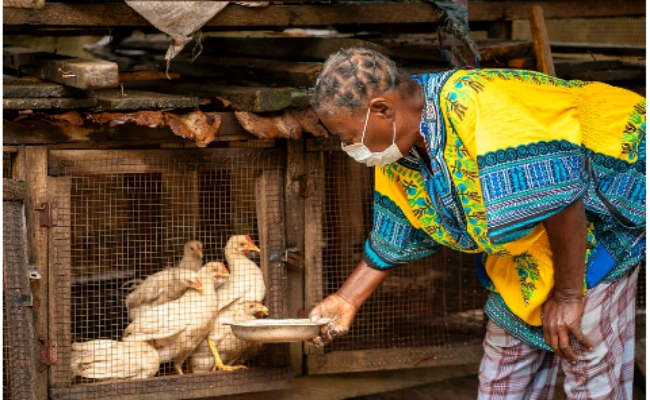- このトピックは空です。
- 投稿者投稿
- 3月 26, 2025 11:41 am #607294

Smallholder poultry farms play a crucial role in providing protein and income for many households in Lagos, Nigeria.
However, these farms often face significant challenges that limit their productivity, with infectious diseases being a major constraint.
Outbreaks of diseases like Newcastle disease, avian influenza, and coccidiosis can lead to high mortality rates, reduced egg production, and significant economic losses for farmers.
Therefore, improving productivity of smallholder poultry farms in Lagos through disease prevention and control is paramount for enhancing food security, improving livelihoods, and ensuring the sustainability of the poultry sector in the region.
1. Prevalence Of Common Poultry Diseases
Smallholder poultry farms in Lagos are particularly vulnerable to various infectious diseases due to factors such as poor biosecurity practices, inadequate housing, and limited access to veterinary services. Newcastle disease, a highly contagious viral disease, can cause devastating losses in poultry flocks.
Avian influenza, another viral disease, poses a threat not only to poultry but also to human health. Coccidiosis, a parasitic disease affecting the intestines, can lead to reduced growth rates and increased susceptibility to other infections.
The warm and humid climate of Lagos can further exacerbate the spread of these diseases. Understanding the prevalence and impact of these common poultry diseases is crucial for developing targeted prevention and control strategies.
2. Impact Of Diseases On Farm Productivity
Poultry diseases have a profound impact on the productivity of smallholder farms in Lagos. High mortality rates during disease outbreaks directly reduce the number of birds available for meat or egg production. Subclinical infections, where birds may not show obvious symptoms, can still lead to reduced growth rates, lower egg yields, and decreased feed conversion efficiency.
These factors collectively contribute to significant economic losses for farmers, undermining their profitability and discouraging investment in their farms. The financial strain caused by disease outbreaks can also force farmers to sell their remaining birds prematurely, further disrupting their production cycle.
3. Key Strategies For Disease Prevention
Preventing diseases from entering and spreading within poultry farms is more cost-effective and sustainable than treating outbreaks. Implementing strict biosecurity measures is fundamental to disease prevention. This includes controlling access to the farm, disinfecting equipment and housing regularly, providing clean water and feed, and practicing proper waste management. Vaccination against prevalent diseases like Newcastle disease is also essential.
Establishing effective quarantine procedures for new birds and isolating sick birds promptly can help prevent the spread of infections. Furthermore, ensuring good ventilation and appropriate stocking densities in poultry houses can reduce stress on the birds and improve their resistance to diseases.
4. Effective Disease Control Measures
Despite preventive measures, disease outbreaks can still occur. Early detection and prompt treatment are crucial for minimizing losses. Farmers need to be able to recognize the signs and symptoms of common poultry diseases and seek professional veterinary advice when necessary.
Access to affordable and reliable veterinary services is essential for accurate diagnosis and appropriate treatment. This may involve the use of antibiotics for bacterial infections, coccidiostats for coccidiosis, and supportive care for viral diseases. Implementing strict biosecurity measures during an outbreak is also critical to prevent further spread to other birds on the farm and neighboring farms.
5. The Role Of Farmer Education And Extension Services
Improving disease prevention and control on smallholder poultry farms in Lagos requires a concerted effort to educate farmers and provide them with the necessary knowledge and skills. Extension services can play a vital role in disseminating information on best management practices, disease recognition, biosecurity protocols, and vaccination schedules.
Training programs and workshops can empower farmers to implement effective disease prevention and control measures on their farms. Utilizing local communication channels and farmer groups can help ensure that information reaches a wider audience. Strengthening the capacity of extension officers and veterinary professionals to provide relevant and timely support to farmers is also crucial.
Improving the productivity of smallholder poultry farms in Lagos hinges on effectively preventing and controlling poultry diseases. By implementing sound biosecurity measures, ensuring access to vaccinations and veterinary services, and empowering farmers with the necessary knowledge, the incidence and impact of diseases can be significantly reduced.
This will lead to increased poultry production, improved farm profitability, enhanced food security, and a more resilient and sustainable poultry sector in Lagos. Investing in disease prevention and control is therefore a critical step towards unlocking the full potential of smallholder poultry farming in the region.
- 投稿者投稿
- このトピックに返信するにはログインが必要です。






